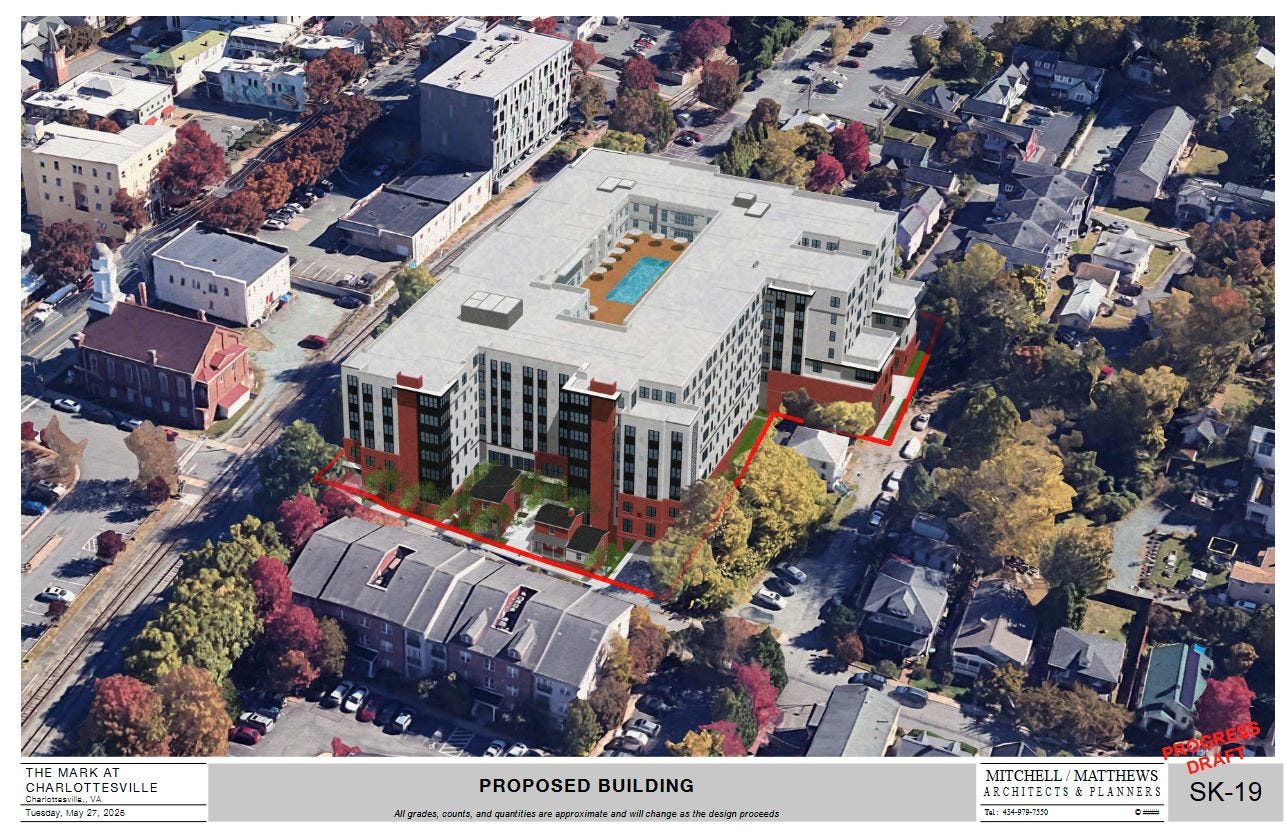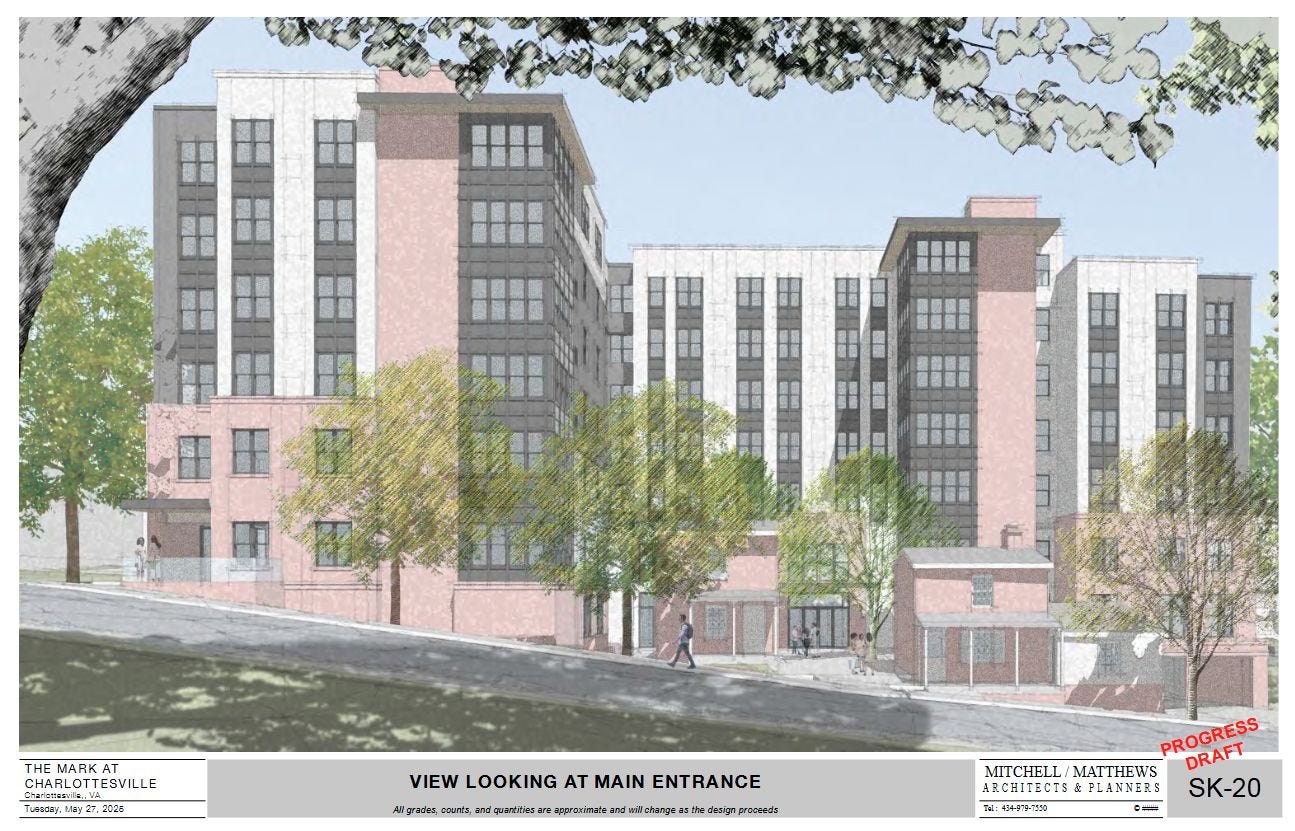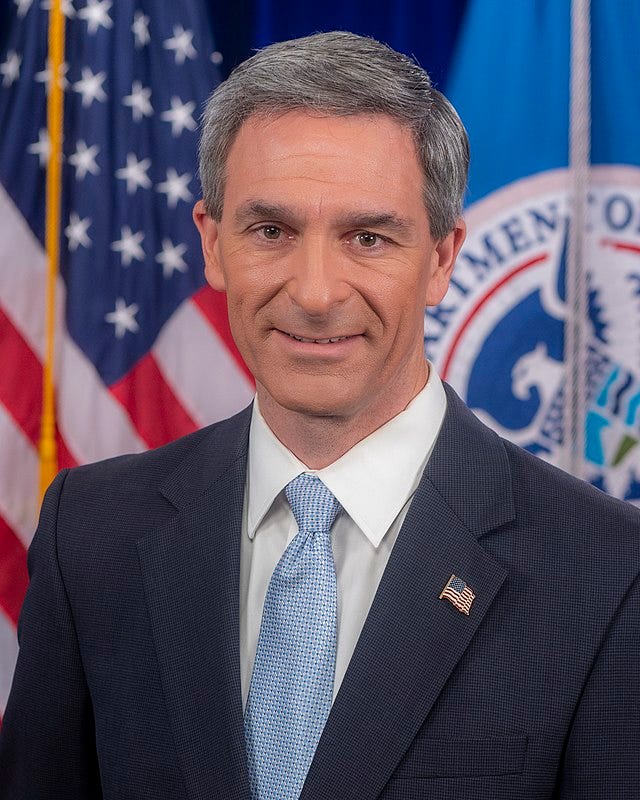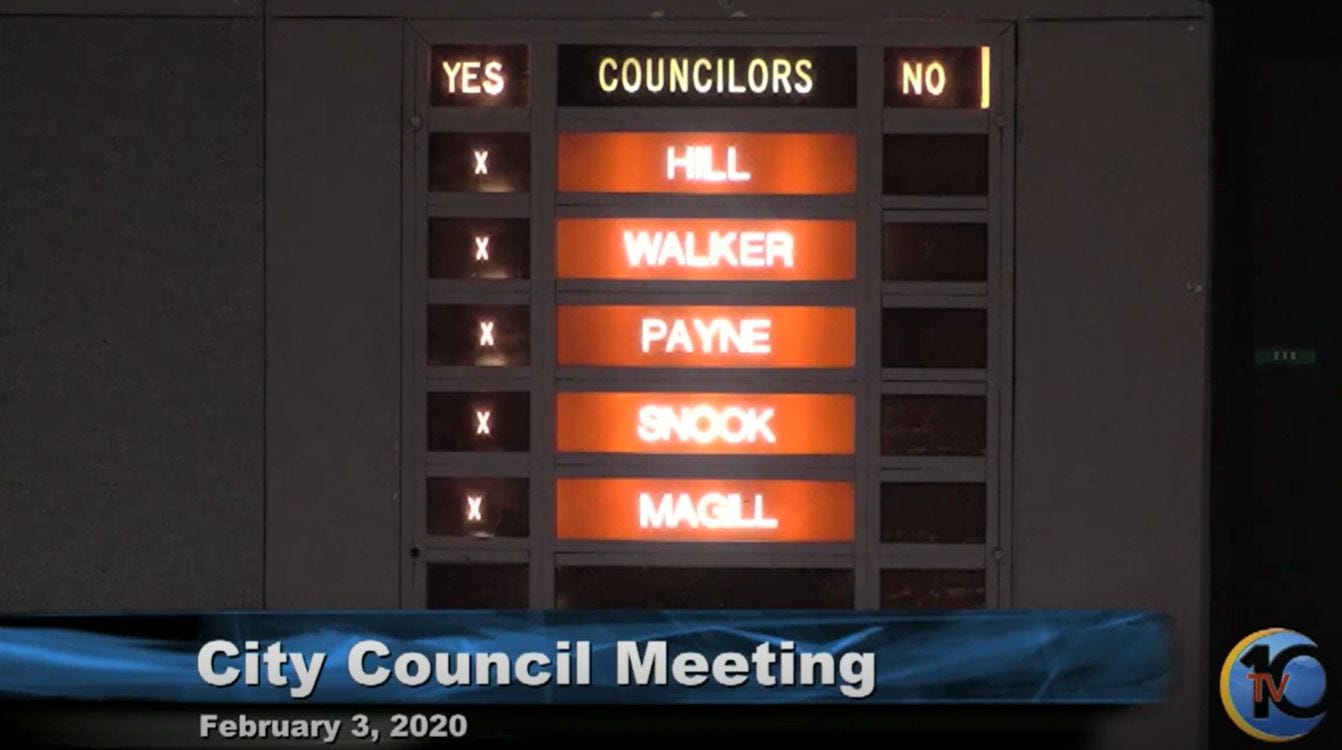June 23, 2025: Board of Architectural Review looks favorably on student housing building in Fifeville but want more attention to historic buildings
Plus: The print version of the final third of Friday’s podcast
Before going too much into the future, there are perspectives that can be gained into looking at snapshots from the past. The writing process for Charlottesville Community Engagement often begins by reviewing the date on Wikipedia and trying to triangulate events to the now.
What can we learn? What relevance can be gleaned from knowing that Sun Quan proclaimed himself emperor of Eastern Wu on this day in 229? What about Christoper Latham Sholes receiving a patent in 1868 for his “type-writer?” I know my life was affected nine years ago when 52 percent of voters in a United Kingdom referendum voted to leave the European Union.
I’m Sean Tubbs, and I’d love to know what jumps out you a look at June 23 throughout history.
In today’s installment:
Four people have been appointed to the University of Virginia Board of Visitors
The Charlottesville Board of Architectural Review has an initial review of a student housing building in Fifeville
The Charlottesville City Council takes action on several actions including a lease renewal for the Blue Ridge Coalition for the Homeless
Council votes 4 to 1 to approve the spending of $8.69 million in surplus funds on budgetary items and community interventions
First-shout: Friends of JMRL Seeking Donations for Fall Sale
Twice a year, the Friends of the Jefferson-Madison Regional Library organize a week-long sale of books and other items to raise money for the regional library system. This past spring, the group raised over $168,000!
They want to use this shout-out to give a big thank you to all the donors and customers who made the record breaking Spring 2025 sale possible. The funds will support JMRL programs, library materials, reading programs and more! That includes the Books Behind Bars program. Volunteers find and ship books to Virginia inmates at no cost to the inmates.
Now it’s time to get ready for the next sale in the fall. You can help by dropping off books at the Gordon Avenue Library. But not only books: DVDs, CDs, LPs, puzzles, games, sheet music and ephemera! For more details and hours of operation, visit the Friends of the JMRL Library website. The group is also looking for volunteers and could always use new members!
Governor Youngkin appoints four to the Board of Visitors
For what is perhaps the penultimate time, Governor Glenn Youngkin has appointed members of the University of Virginia’s governing body. Four new names were announced for the Board of Visitors on June 20.
They are:
James Donovan of Upperville, Vice Chairman, Goldman Sachs
John F. Harris of Charlottesville, private investor
H. Eugene Lockhart of Palm Beach, Florida, former CEO, Mastercard; Co-Founder, Mission OG
Calvert Saunders Moore of Locust Valley, New York, President, Ivor & Co., LLC
Donovan has served as an adjunct professor at the University of Virginia but did not attend as a student. He is also on the board of the Karsh Institute of Democracy. Donovan had been nominated to serve as Deputy Secretary of the Treasury in the first administration of President Donald Trump but withdrew his name from consideration.
Harris a 1982 graduate of the McIntire School of Commerce. He’s also on the board of the Virginia Film Festival and according to his bio he served as managing director and chief financial officer of The Carlyle Group from 1997 to 2007 and served there as a senior advisor through 2011. He served as executive producer for a sports documentary about the 2015 UVA Men’s Baseball team that won the NCAA Championship.
According to his bio on MissionOG, Lockhart graduated from the University of Virginia with a bachelor of sciences and an MBA from the Darden Graduate School of Business. He founded the company in October 2014.
Moore is a 1990 graduate of the College of Arts and Sciences and the daughter of Thomas A. Saunders III and Jordan Saunders. The trio made a $10 million contribution to the Jefferson Scholars Foundation in 2021.
Youngkin may have one more slot to fill.
On June 9, the Senate Privileges and Elections Committee declined to confirm the appointment of Ken Cuccinelli to fill a vacancy left after Youngkin fired Bert Ellis. The party-line vote was 4 to 8 with a status of “failure to report.”
However, Cuccinneli is still listed as a member on the BOV website. A request for clarification is pending.
BAR takes a look at Fifeville student housing project
Under the new development code, preliminary applications with the Board of Architectural are becoming an important first step before formal plans are filed with the city’s Department of Neighborhood Development Service.
On June 17, 2025, the BAR was asked to provide comment on a proposed seven-story building planned for the Fifeville neighborhood on 7th Street WW. That size is allowed under the new rules if certain availability conditions are met.
LCD Acquisitions, a company that traces back to Landmark Properties of Georgia. They’re the same company that developed the Standard on West Main Street. They are the contract purchase of three properties including two that are individually protected under city code.
That’s because they have two historic structures on them that date back to the 19th century and are the work of a brick mason named James Hawkins. The parcel at 202 7th Street SW is not within a historic district but the developer wants to add new construction to a portion of the two protected properties.
“That new building would encroach onto the parcels that are protected,” said Jeff Werner, the city’s preservation planner. “We have to pay attention to the new building but not lose sight that the reason we're evaluating this is because of these two brick [buildings].”

In the last ten years, the BAR has twice approved development of two large buildings on West Main Street that were constructed behind protected buildings. In this case, if Landmark Properties decides not to touch the two protected parcels, the BAR would have no review at all.
“We're asking for permission to remove a 1970 shed,” said John Matthews with the firm Mitchell Matthews. “And we're asking for permission to build behind, to the rear of the existing structures.”
Matthews said the new construction would be further away from the protecting buildings than the Doyle and Six Hundred West Main are to the structures on those properties. He said 204 7th Street SW has not been inhabited for over 20 years but a new development would ensure their fabric was kept.
“By approving this project or similar projects to this, you actually ensure that the existing buildings will be repaired, rehabilitated and maintained indefinitely,” Matthews said.
The older structures would be used for some sort of a shared space for the larger apartment building. Matthews said the proposal fits with the Comprehensive Plan goal of providing more housing throughout the city.
“It’s in line with the zoning ordinance, and it will put residential where people can walk to West Main Street, walk downtown and walk or ride their bikes to campus,” Matthews said.
Matthews also said the developer will likely pay cash to the city in order to satisfy the affordability requirements. Those details will become known as the project moves forward. He said he is hopeful to get the BAR’s approval this summer so that the project can be ready in three years in time for the fall of 2028.
The BAR also might play a role in determining whether the structure can rise to the seven stories allowed by-right, but that part of the new development has not been tested yet. RX-5 allows five stories but two additional floors can be granted if more affordable units are provided.
Matthews said there were many materials about the project that have not been shared with the BAR because their role is limited. He said seven stories are needed to make it feasible.
“We've met multiple times with planning, multiple times with zoning,” Matthews said. “We've met with fire marshals. So we really are pretty confident that what we're showing you and what we tell our client is achievable under the new ordinance.”
Planning Commissioner Carl Schwarz also serves on the BAR and he said he appreciated efforts to keep the two historic buildings. However, he said drawings shown did not look right to him.
“When I'm looking at your renderings, this feels a lot more like those pictures you see where there's a holdout, like someone doesn't want to sell their property, so they build a big skyscraper around it,” Schwarz said.
Schwarz suggested pushing the buildings back and planting additional trees in the wider buffer. Other BAR members also wanted Matthews to find ways to provide more room for the historic structures.

BAR Member Cheri Lewis suggested that the units could be used by the community at large.
“The obvious thing I'm thinking of is a coffee shop in one of them or maybe in both of them,” Lewis said. “You know, that would draw people in. A commercial presence would certainly be awesome.”
The BAR was generally favorable about the plan but had concerns about the relationship between the old and new. Matthews agreed to come up with an additional picture that depicts the way the historic buildings look from the new structure.
Second shout-out: Supporting the Keswick Heritage Fund’s Love Better Project
The Keswick Heritage Fund is a partnership of several churches in Albemarle County that provides education support and opportunities for professional development. One of their outreach programs is the Love Better Project, which provides scholarships to Black students in the Keswick area. The fund was created soon after the inaugural scholarship was awarded in 2020.
Grace Episcopal Church, Union Grove Baptist, Union Run Baptist, Zion Hill Baptist and St. John Church are united for growth through community partnership and education. To learn more about the fund, the scholarships, and the churches themselves, visit their website at keswickheritagefund.com.
A series of votes from Charlottesville City Council
The podcast edition last week focused entirely on the June 16, 2025 edition of Charlottesville Community Engagement. I had to fill about ten minutes of new material and that new copy shows up here.
Last week in the June 17, 2025 edition of the newsletter, I reported on the use of a new meeting management system. I wanted to memorialize that in the audio and the distinct sounds that could be heard as Councilors pushed buttons that moved physical mechanisms to display how they voted.
That system has now been replaced with a computerized system that displays results on two computer screens. The old board has been removed.
Afton Schneider, the director of the city communications and public engagement, said the system is an extension of the Civic Plus system that has been in place for a while. After many years of using the old board, it was time to make a change.
“When Council elections occur and members cycle on and off, it is becoming increasingly challenging to schedule Facilities staff who are trained or skilled in wiring the old voting board to the voting buttons on the dais, especially when Council's seating arrangement changes,” Schneider said.
The new system allows for votes to be recorded more easily and for the City Council Clerk and her staff to incorporate votes into the system.
“On the occasion when a Councilor needs to participate in a meeting electronically, they will be able to cast their vote through the same process as those in the room by logging in to their device,” Schneider said.
Because the system wasn’t quite working in time, a series of voice votes had to be held. One of them was for the closed session resolution. Council met privately to conduct a performance review for City Manager Sam Sanders and to consider nominations to two appointed bodies.
On another voice vote when they came back, Council made appointments to the Charlottesville Retirement Commission but not to the Charlottesville Redevelopment and Housing Authority. The terms of Wes Bellamy and Laura Goldblatt end on June 30.
There were three public hearings. The first was to appropriate additional funds from the Virginia Department of Transportation for various road projects. This is to make up for cost overruns.
“Though it looks relatively complicated, it's actually a fairly simple resolution,” said Mike Goddard, Charlottesville’s deputy director of public works. “We're appropriating, with two exceptions. We're appropriating VDOT funding for VDOT projects that the city is administering.”
No one spoke at the public hearing and there was no need for a vote because the item will be on Council’s consent agenda on July 7 for a second reading. Councilor Natalie Oschrin had asked if it would be useful to vote to waive second reading, something that has become much more common in recent years.
The next item was to approve a lease renewal for the Blue Ridge Coalition for the Homeless to rent a portion in CitySpace. This also took a public hearing, no one spoke, and the vote was taken on voice vote.
A third public hearing was held for amendments to Charlottesville’s allotment from the federal government for Community Development Block Grants and the HOME program. Anthony Warn works for the city’s soon-to-be-dissolved Office of Community Solutions.
“It's my pleasure to come before you tonight and announce that we received a little bit more money, much to our surprise, for both the community Development block Grant program and the home Investment Partnerships program this year,” Warn said.
The difference is under $10,000. Warn recommended allocating a proportion of the additional CDBG funding to entities already awarded funds and that all of the additional HOME go to the Piedmont Housing Alliance so they can close a funding gap for a project to build 12 units at a single family house at 905 Rives.
Council agreed, but one member said they should waive the required second reading.
“My only comment would be, as we know the speed with which federal money can be or federal gifts can be rescinded, I would say that maybe we vote this through today,” said Councilor Natalie Oschrin.
It takes a supermajority of four votes to waive a second reading. The vote was about to be taken until City Council Clerk Kyna Thomas said she wanted new city attorney John Maddux to weigh in.
“This is an appropriation of these funds per 2-98 of the city code,” Maddux said. “That would require a second reading. I'm sorry, I. Even with the second to step back in. Yes, this would require a.2 readings and you cannot waive appropriation.”
Councilor Michael Payne said he felt Council should take the two votes even if they could waive the rules.
“I think doing these two readings is good on our end for both compliance and transparency and I just still come down there,” Payne said.
No one spoke at the public hearing.
This item will be on the consent agenda on July 7.
Council holds second vote on $8.69 million appropriation from CIP contingency
There’s time for one last item today, and it’s about halfway through Council’s action items. On June 2, 2025, Council held the first reading on a resolution to use $8.69 million from the Capital Improvement Plan’s contingency fund for a series of items.
“As we've discussed, this fund is basically generated from funds for prior year surpluses and last,” Hammill said. “At the last Council meeting, City Manager Sanders presented to you a PowerPoint that listed a bunch of what he termed community interventions.”
That makes up about half of the resolution. The other items are budgetary items such as paying the Teamsters additional money required under their collective bargaining agreement.
Community interventions included in the $8.7 million are:
$280,000 for a long-term solution for a public restroom on the Downtown Mall. The city currently rents from York Place.
$425,000 to hire two employees for two years to do “street outreach” with individuals who are unhoused
$100,000 for a generator for Key Recreation Center, which serves as an emergency shelter
$1.2 million for a “Clean Team” for a two-year pilot to assist with upkeep of the Downtown Mall
$500,000 for “urgent infrastructure” projects
$250,000 for 12 bus shelters
$1.1 million for parks and recreation improvements (Downtown Mall, Meadow Creek Trail)
This vote was also done by voice.
The no vote came from City Councilor Michael Payne because he said he was opposed to the $1.2 million to come for the Green Team pilot.
“Anytime we outsource work, I'm very concerned that we're undermining our unionized workers,” Payne said. “And it's almost guaranteed when we outsource, they will not be unionized. They will have lower wages and they will have worse, potentially no benefits.”
I have run out of time for #833
This was a whirlwind. Monday morning is for C-Ville Weekly and the Monday edition of this newsletter is often the print versions of material that was in the podcast. The original idea was to have today’s C-Ville Weekly story be a follow-up from the BAR meeting on the Mark project, but my editor thought that might be too similar and my other story for the June 25 issue is about something close by.
So I first thought I would explore one story, did some reporting, and then decided I should let that story wait. So I went with another story that you’ll have to wait until Wednesday to read!
I am grateful for my partnership with C-Ville Weekly.
And now I cut this one short because I need to be on the radio in 20 minutes and I’ve not showered yet. This is the sort of behind the scene information that happens from time to time.
Also, this sort of thing. I rediscovered trackers from the late 80’s and 90’s. There’s so much to know.







